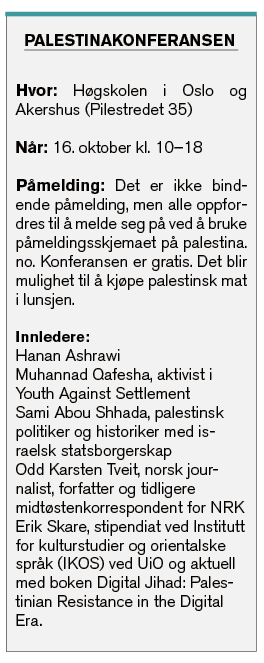(THIS ARTICLE IS MACHINE TRANSLATED by Google from Norwegian)
"There is a big difference between the resistance during the first intifada and the resistance we see today," Hanan Ashrawi told Ny Tid. "The first intifada was a non-violent struggle against an Israeli military presence that affected all aspects of our lives. Since then, Israel has changed its occupation. They do not control our lives directly, but do everything in their power to keep us in control anyway. Gaza is under a cruel siege, while the West Bank is completely divided. Now they are also working to completely change the demographics of Jerusalem, "said Ashrawi.
The Palestinian diplomat, academic and politician became internationally known when she was the spokesman and prominent member of the Palestinian delegation to the Madrid peace talks in 1991 – 1993, having been a leading figure during the first intifada. In 1996, she was appointed to be Minister of Research and Higher Education, a title she later said in protest against political corruption. She is now a member of the Palestinian Legislative Council (PLC) and chair of the Palestinian Initiative for the Promotion of Global Dialogue and Democracy (MIFTAH), and comes to Oslo to attend this year's conference.

Intifada or not? The escalating violence in Israel and Palestine has taken many lives since the fall of 2015, and has allowed the Israeli military to carry out executions of Palestinians on the open street. In many places the events are referred to as the "knife intifada" or "Jerusalem intifada". Ashrawi himself is uncertain whether this can be considered a third intifada. "This is not a mass pattern like the one seen during the first intifada. The actions are largely performed by youth, usually alone, at checkpoints and border crossings. We certainly have organized protests this time, too, where Palestinians are shot and killed by Israeli forces. But the nature of the rebellion means that I still would not call it an intifada. For me, an intifada is primarily non-violent resistance, ”Ashrawi says.
Israel's collaboration with Facebook. This summer, Ny Tid wrote about Palestinian Majd Atwan (22), who is one of several who have been imprisoned by Israeli forces after commenting on Facebook. According to the online newspaper Middle East Monitor, Israeli Justice Minister Ayelet Shaked and the country's security minister Gilad Erdan recently announced that Israel is cooperating with Faceook to prevent and remove provocations they believe could threaten Israel's security. A few days later, the newspaper Al Jazeera reported that editors of Palestinian, leading online newspapers had lost access to their Facebook accounts. Ashrawi says she is unsure whether the agreement has entered into force, but is surprised that Israel is even considering asking the SoMe giant to assist them in what it believes is censorship:
"The web gives access to the rest of the world, and people get a chance to engage in resistance in a meaningful and good way."
“Israel presents itself as the only democracy in the Middle East while monitoring people and what they write on social media. If it is true that Israel has tried to get Facebook to close its accounts to Palestinians and others who oppose the occupation, I think it is absolutely haunting, ”she says. “Social media has become incredibly important. International media does not play a neutral role – often Israel has a very strong influence over it. Now everyone can be narrative witnesses and share stories of what is happening on the ground in Palestine. The internet gives access to the rest of the world, and people get a chance to engage in resistance in a meaningful and good way, ”says Ashrawi.
 Believe in boycott. The global boycott, divestment and sanctions (BDS) movement against Israel was initiated by the Palestinian civil society in 2005. The movement is coordinated by the Palestinian BDS National Committee (BNC), which was established in 2007. BDS is a strategy that allows citizens to contribute to the Palestinian fight for justice – a struggle that continues until Israel respects international law and the rights of Palestinians. Israeli Prime Minister Benjamin Netanyahu has on several occasions expressed dissatisfaction with the BDS movement, and referred to it as "classic anti-Semitism in a new suit" this month.
Believe in boycott. The global boycott, divestment and sanctions (BDS) movement against Israel was initiated by the Palestinian civil society in 2005. The movement is coordinated by the Palestinian BDS National Committee (BNC), which was established in 2007. BDS is a strategy that allows citizens to contribute to the Palestinian fight for justice – a struggle that continues until Israel respects international law and the rights of Palestinians. Israeli Prime Minister Benjamin Netanyahu has on several occasions expressed dissatisfaction with the BDS movement, and referred to it as "classic anti-Semitism in a new suit" this month.
Ashrawi, for his part, believes that the BDS movement can be an effective way of forcing Israel to follow international laws and regulations: “Israel must be held accountable for the human rights violations they commit. International laws and regulations must also be followed by them. If they don't, we will never achieve peace, ”Ashrawi concludes.






